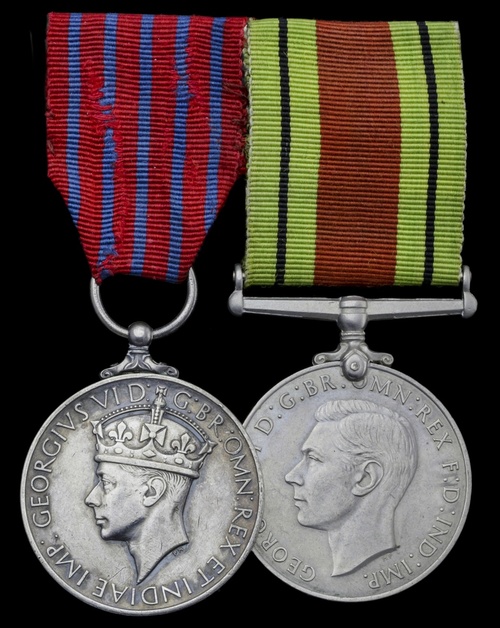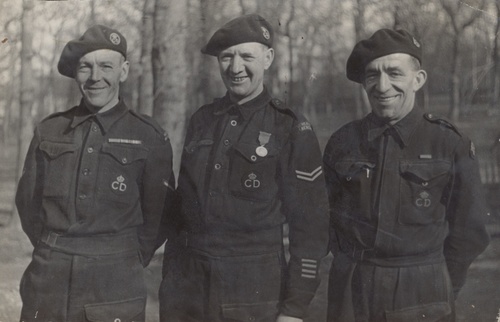Auction: 20002 - Orders, Decorations, Medals & Space Exploration
Lot: 576
A poignant 1943 G.M. pair awarded to Squad Leader B. H. Smith, Croydon Civil Defence Rescue Service, who skillfully and courageously effected the extraction of a man from his bed in the bombed-out ruins of a block of flats and offered continual comfort when it became apparent that the man's wife had been killed by falling debris from the floors above
George Medal, G.VI.R. (Benjamin Henry Smith.); Defence Medal 1939-45, mounted as worn, minor contact marks to first, very fine (2)
G.M. London Gazette 10 September 1943. The joint citation to Benjamin Henry Smith, Squad Leader, Civil Defence Rescue Service, Croydon (awarded G.M.), Sidney Christopher Chapman, Deputy Leader, Civil Defence Rescue Service, Croydon (awarded B.E.M., Civil Division), and Jack Robinson, Acetylene Cutter, Civil Defence Rescue Service, Croydon (awarded B.E.M., Civil Division), states:
'Bombs caused damage and flats were demolished. The whole of the floor, ceiling and roof of a top flat crashed down through to the ground floor flat and a man was trapped in the debris which was precariously balanced and further endangered by a badly damaged party wall and chimney breast.
After a rapid and clever appreciation of the situation, Smith, Chapman, and the rescue squad commenced tunnelling. Whenever the debris appeared to be in danger of collapsing, either Smith or Chapman got in under the wreckage and carried out any necessary strutting to prevent movement. The victim, who was firmly wedged and unable to move, was continually comforted by both the Leader and his Deputy and later by Robinson. The rescue operation was extremely difficult and dangerous. The unstable mass of debris had to be cut into and so little space was available, that a mattress, bolster and pillow had to be plucked out handful by handful and the metal mattress and the head rails of a bed had to be cut through in order to effect the rescue.
Smith, in most difficult circumstances, directed the operation with skill and courage and was greatly helped by Chapman and Robinson, who worked without regard for their own safety.'
An original letter which accompanies the lot from the Regional Commissioners, London Region Civil Defence Headquarters, dated 9 September 1943, adds further detail:
'Sir,
We have drawn the attention of the Minister of Home Security to your distinguished leadership on the night of 31st May, 1943, when two blocks of flats in Parchmore Way, Croydon, were demolished. Regardless of the danger from shifting debris, you worked for four hours to rescue a man, whose wife had been killed by the falling debris. Your efficiency and courage were an inspiration to the members of your Squad.
Mr. Herbert Morrison felt that your courage and resource were deserving of high praise and he took steps to bring the matter to the notice of His Majesty the King. We have the pleasure of informing you, at the request of the Minister, that His Majesty has been graciously pleased to award you the George Medal in recognition of the courage which you displayed.'
Benjamin Henry Smith was born around 1899 at Canning Town, West Ham, the third child of Benjamin Smith and his wife Mary, of 40 Fox Street, Canning Town, East London. A schoolboy in 1911 he later took employment as a labourer and lived at Clifton Road in South Norwood. It was whilst living at this address that he caught the attention of the local press in December 1923:
'Let Go of My Pal!
Artillery Drivers who Struck a Policeman
A sequel to a Saturday night scene in North End, Croydon, was the appearance on Monday at Croydon Court, of Benjamin Henry Smith (23), labourer, Clifton-road, South Norwood, and Wm. Legg (23), a Driver in the Royal Horse Artillery, who were charged with being drunk and disorderly, and Joseph Broughton (21), a Driver in the Royal Field Artillery, with assaulting P.S. Abbott by striking him in the face with his fist.
Smith declared he did not remember anything about it, Legg pleaded guilty, and Broughton, when asked if he was guilty or not guilty, replied that he did not know.
P.C. Nober stated that shortly before ten o'clock on Saturday night there was a large crowd outside Wilson's café in North End. On going there he found Smith arguing with a number of people and challenging them to fight. Witness ordered him to go away, but he refused. When witness and P.C. Pearton arrested him, he became violent.
P.S. Abbott deposed that he saw Smith in custody, struggling violently, and Legg trying to rescue him. Witness ordered Legg to go away quietly and he went into the Crown Hotel. Then witness was called to the Crown to eject him, and when doing so in the passage near the door Broughton came up and struck him in the face saying "Let go of my Pal."
Witness released Legg and arrested Broughton, who was very violent all the way to the police station. Broughton asked Sergeant Abbott if he was drunk, and the officer said he was not. P.C. Pearton also said that he told Smith to go home three times, but he refused, and wanted to fight. Broughton pleaded that he had only just come out of hospital, and two or three drinks upset him. Smith was fined 10s.; Legg ordered to pay 10s. 6d. medical fee; and Broughton was fined 20s.' (The Norwood News, 11 December 1923, refers).
Reprimanded for his poor behaviour, it appears that Smith spent the next twenty years becoming a pillar of the community. In May 1940, he married Amelia Mary Smith, the daughter of Mr. J. E. Smith of 48, Broad Avenue, Bedford. A congratulatory article published in The Bedfordshire Times & Bedfordshire Standard adding that Benjamin Henry Smith served as Assistant Scoutmaster of the 101st Bedfordshire (Kempton) Scouts. As a result, the happy couple were met by a guard of honour formed by his Scouts as they exited the doorway of St. Leonard's Church in Bedford.
Taking up residence at 41 Zion Road, Thornton Heath, Smith began to channel all his energies into the Heavy Rescue Service of the Croydon Civil Defence. Having likely witnessed the carnage of the London Blitz, he was called to action on the night of 31 May-1 June 1943 when attempting to rescue 63 year-old Mr. Charles Ernest Craggs of 206 Parchmore Road, Thornton Heath. Struck by a high explosive bomb, the elderly gentleman's newly constructed apartment block had collapsed in on itself and killed his wife, 55 year-old Eleanor. The same stick of bombs had further destroyed 214 Parchment Road, killing Terence Ralph Willett, a 7 year-old schoolboy.
Originally recommended for a B.E.M., Smith's award was upgraded to a G.M. which he received from the hand of King George VI at an Investiture held at Buckingham Palace on 8 February 1944. He died in June 1961 at Croydon; sold with original letter from London Region Civil Defence Headquarters; original typed invite letter to an Investiture at Buckingham Palace, dated 8 January 1944, an attractive group photograph of Smith, Chapman and Robinson in Civil Defence uniform, the former proudly wearing his George Medal, contemporary Civil Defence armband, Civil Defence uniform buttons (7), besides further copied research.
Subject to 20% VAT on Buyer’s Premium. For more information please view Terms and Conditions for Buyers.
Sold for
£4,500
Starting price
£2800







